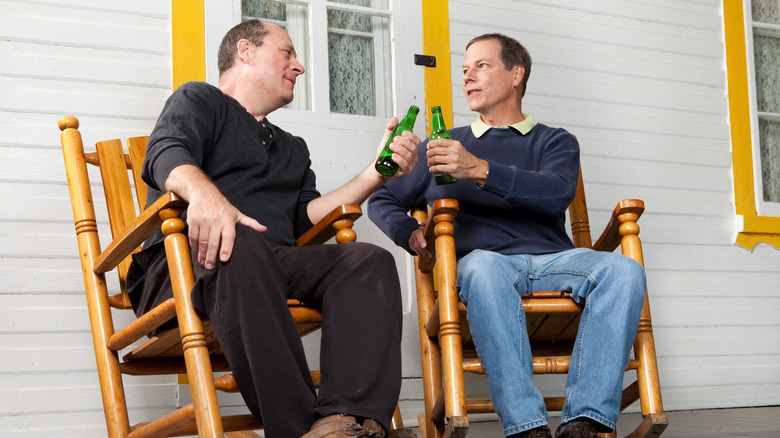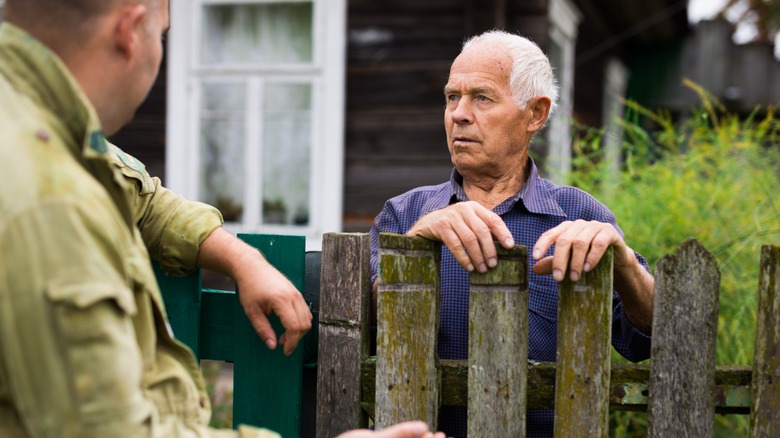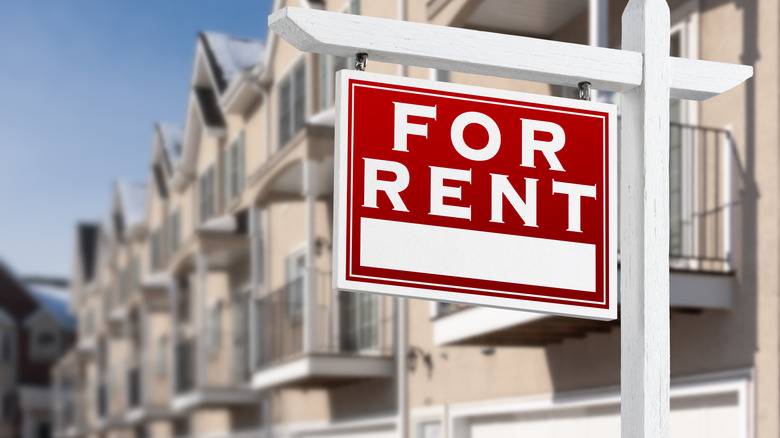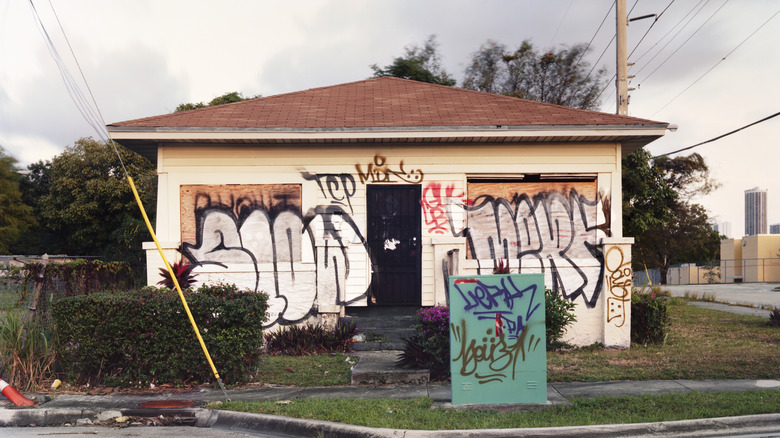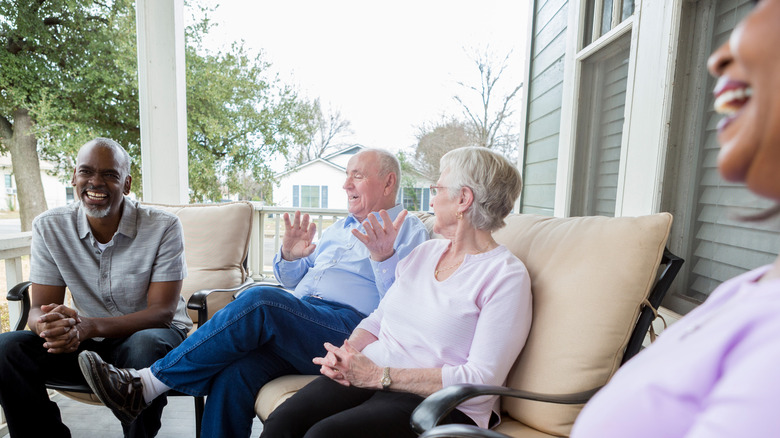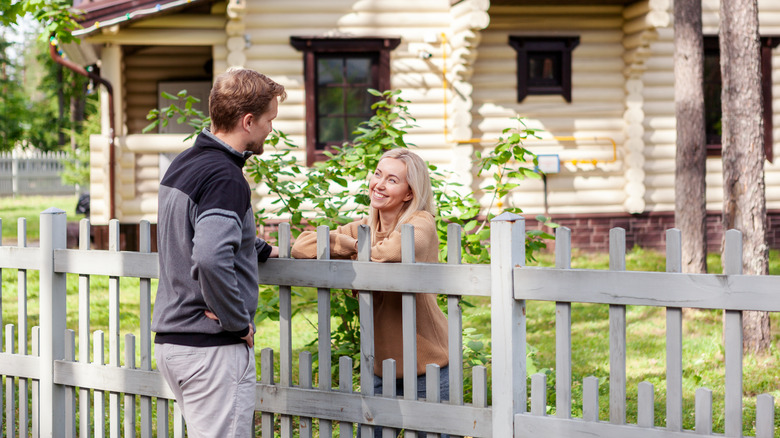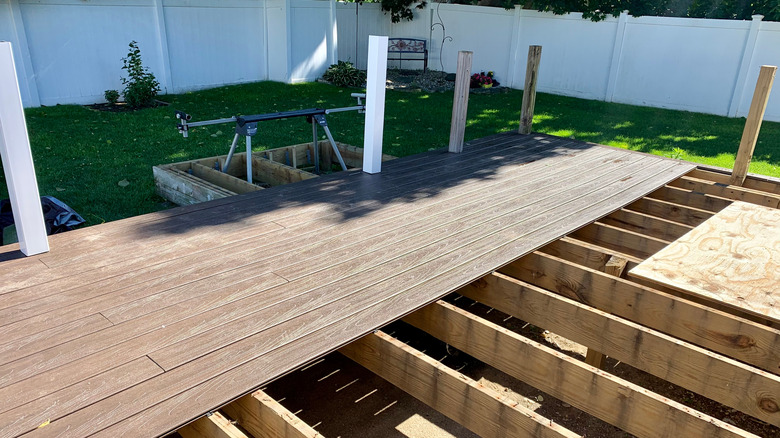Why You Should Talk To Neighbors Before Buying A New Home (And What To Ask Them)
Although they can sometimes be overbearing as a bull at a gate, neighbors can have their uses. Clearing the driveway when it snows can be one and taking in your Amazon parcels when you're at work can be another. They are also a potential gold mine of information for newcomers and outsiders looking to move to the area. Lest we forget, no one knows a neighborhood like a neighbor, and whenever you're considering buying a new house, it's always a good idea to talk to the locals first.
Neighbors are nosy by nature and can give you the complete and unabridged lowdown on the property and area you're considering moving to. Their experience and knowledge could prove priceless and might just be all that stands between you and a huge mistake. They know the streets you just might call home like a pair of comfortable slippers or, perhaps, unbearably painful stilettos. Either way, don't be afraid to knock on a few doors, introduce yourself, and gently interrogate them over a glass or two of something friendly. Here's why it pays to get to know your neighbors before buying a house and what you should ask them.
Neighbors have firsthand experience of the area you're moving to
Neighbors are like the canaries in a coal mine when it comes to moving into any new and uncharted area. They can warn you of potential negatives about the neighborhood or simply reaffirm your choice to move there. Ideally, you'll want to find someone who has lived in the area for a considerable amount of time. They'll be able to tell you if it's changed much over the years and if that change is for the worse or the better.
There's nothing like firsthand experience, and locals are the best people to ask what a place is really like. In the digital age, communication is no longer shackled by the laws of physics and the tyranny of space and time. If you're unable to visit your neighbors in the flesh, try finding a local community Facebook group and sending out a few feelers about the exact area you're considering moving to, and see if anyone has experience living there. People love to help and talk about their neighborhood, so you'll likely be pleasantly surprised at the response.
Neighbors tend to be more honest than estate agents
A house sold on a real estate agent's website is usually a lot different from the house you'll find in the actual neighborhood. When an agent is trying to earn a commission on a house, part of their mission is to accentuate the positives of the property. This may mean they spend more time talking about the attractive qualities of the home rather than any drawbacks.
However, neighbors may be more inclined to be completely transparent about their experiences and won't give you the hard sell. Nor may they neglect to tell you about your potential house's troubled past or if crime statistics are above the national average in the area. The picture your neighbor will paint might not always be pretty, but it'll be an honest one. Whereas you only can ask an estate agent important questions about the house based on what you already know or what they choose to tell you, a neighbor can help you fill in the blanks. Knowledge is power, and forewarned is forearmed.
It gives you a chance to check out who you'll be living next door to
Love them or hate them, neighbors are part and parcel of life. Some you'll get on with, others you'll cultivate a civil indifference to, and a few you'll despise with a passion bordering on the psychotic. Before you find yourself trapped at an awkward "welcome to the neighborhood" barbecue, surrounded by people who make your skin crawl, and wondering where it all went wrong, take a little time to check out who you'll be living next door to. It could save you a lot of grief!
Arranging to visit at different times of the day is a great way to get a real feel for the neighborhood. For example, before 9 a.m. you'll see if the area consists mainly of working people. An early evening visit allows you to gauge the number of teenagers who hang around and kids who play in the streets. And, a late visit will determine how much peace and quiet you can expect at night. Above all, try to naturally engage a few residents in conversation and see if you share some common ground. Time, circumstances, and petty car-parking wars often cause a periodic fallout with even the most cordial neighbors. However, if the sight, sound, and presence of the creatures next door make you feel uncomfortable from the get-go and you balk at getting along with difficult neighbors, then perhaps this neighborhood isn't for you.
How long have they lived in the area?
So, you've arrived at your soon-to-be neighbor's doorstep, armed with a wealth of questions and a cat-killing-sized curiosity. Yet you're a bit unsure as to what question to ask first. It's probably best not to go straight for the jugular and ask about the area's murder rate, but start with a gentle ice breaker such as, "Excuse me, I'm thinking of buying the house next door. Would you mind telling me how long you've lived here?" This puts your neighbor naturally at ease and primes them nicely for the interrogation to follow. Once you've ascertained how long they've lived there, you may want to ask why they first moved to the area, why they stayed, and if they have any plans to sell in the immediate future.
The length of time people choose to stay in a neighborhood is usually a sound indicator of how desirable a place is to live. When you move somewhere, you're usually planning to stick around for the long term. You can typically assume those who have been around for a while are happy with their little patch and the grass isn't greener elsewhere. Finding out why they moved there can also confirm if they saw it as a desirable place to aspire to. Their answer to why they stayed and their plans for selling might confirm what you already know, but it also will probably encourage them to share a few more details about the area.
How many rental properties are in the area?
Once the conversation is flowing and you're building a sound rapport with your new friend, it's time to casually pop into the conversation, "So, do many people rent around here?" It's important to not make it sound like an accusation, because, unless you've established otherwise, the person you're chatting with could be renting their accommodation and may feel you're judging them. If they reply that there is an inordinate number of rental properties, you might want to follow it up with asking why they think that is and if the neighborhood has a high turnover of people arriving and departing.
It's important to establish if there is a large number of rental properties in the area because it might mean that it's not a place where people want to settle and put down roots. And, when the time comes to sell your house, you might struggle to shift it in a community that is primarily made of renters. Walker Reid Realty real estate agent Lynette Kohn Huber told Apartment Therapy, "You don't always like to think about the prospect of reselling a home just as you are about to buy, but you always should. You never know what might come up in life and you'll be forced to move again." It's an unfortunate but common truth, if you own a house surrounded by rental properties, its value can stagnate or worse still, drop!
Is there much crime or vandalism in the neighborhood?
By this point in the conversation, your potential neighbor is probably warming to you and thinking what a swell person and welcome addition to the neighborhood you'd be. This is exactly the point to hit them with that uncomfortable question no one likes to ask or be asked, but sadly, it's a necessity. You can couch it in terms such as, "Do you feel safe walking around these streets after dark?" Or, "Does the neighborhood have many police patrols?" Perhaps even, "Do you let your children play outside alone?" Or, "Are you reliant on a strong security system?" However you phrase it, you need to know if the area you're thinking of moving into suffers from a high crime rate or not.
It's important to feel safe and secure at home, and nothing threatens that feeling of security like an anti-social and crime-riddled neighborhood. If there's a drug problem, a high occurrence of muggings, or a problem with vandalism, you need to know about it. It's important to drive through the neighborhood both day and night to observe if you feel safe in the area 24/7. However, you can't beat talking to neighbors. If they're friendly, trusting, and unguarded, it tends to mean the omens are good and they live in a relatively crime-free area.
How busy is the neighborhood?
As you wander the streets of any place you might one day call home, it's important to keep your eyes open and pay attention to the little details. If the playgrounds are busy with kids and there's a lack of abandoned or run-down properties, it's usually a good sign you're in a nice area. A neighborhood full of hustle and bustle — with people coming and going, saying hello and goodbye — puts a person at ease in the way a deserted and dilapidated area doesn't. However, not everyone likes the noise of cars constantly coming and going, kids playing, and people gossiping over garden fences. So, be sure to ask your neighbors how busy the neighborhood gets and at what times of the day and night it is at its busiest.
We're all cut from different cloths. Some prefer the cut and thrust of a high-energy and active neighborhood, while others prefer the more sedate lazy Sunday afternoon vibe. Whatever floats your boat, it's important to gauge whether you'll be happy with the pace of the area you're considering moving to. Loud parties are all well and good, but no one wants them seven days a week.
Are you moving into a strong community?
It's no fun moving into a neighborhood where suspicious glances, judgmental shakes of the head, or an overriding sense of disapproval are the order of the day. Such an area is lacking somewhat in community spirit. Be sure to ask your neighborly source of information if people tend to get together regularly for barbecues, clubs, and neighborhood meetings. This is also an ideal opportunity to ask if the neighborhood consists mainly of young families, professional couples, senior citizens, or a healthy blend of all groups, You might also want to ask how pet-friendly the area is and if a lot of dogs and cats live nearby.
Some people like to simply dip their toes into community life from time to time, while others enjoy immersing themselves within it completely. It's important to get a sense of how the wind blows in any potential neighborhood, so you can be sure it's the right fit for you and your needs. Well-maintained houses, manicured lawns, and the absence of trash and litter are usually good signs of a neighborhood with a strong sense of community spirit, but always talk to neighbors because appearances can be deceptive.
Are they aware of any potential issues with the house?
Moving to a new property is an exciting time. However, in the heady rush of buying what you believe is the house of your dreams, it's often easy to overlook a few things. Before you know it, your optimistic surge of momentum has been curtailed by the cellar unexpectedly flooding, the roof falling in, or a terrible case of mold and damp slowly appearing through the freshly painted walls. A lot of this can be avoided if you take the time to ask your friendly neighbors if they're aware of any potential issues with the house you're considering buying.
A neighbor who is on the ball will be able to tell you of any preexisting structural damage to the house the previous owners neglected to disclose or if the property has been vacant for a significant period of time. It sometimes happens that a buyer is unaware that the property they're moving into hasn't been lived in for years. In such instances, you could be walking into a minefield of dampness, pest infestations, and other neglect common to unoccupied buildings. If there was no one at home for years, the neighbors will know!
Did the previous owners complete any repairs or remodel?
By this point in the conversation, your new neighbor may have enthusiastically taken on the role of "best friend for life" and will launch into the entire history of your potential home without any prompting. This is manna from heaven for you because if there were any repairs or renovations to your home you were in the dark about, the chatty neighbor can cast a light on them. It's always sound advice to find out about any extensions or remodels the former occupants completed before moving in. So, if they hint at something, be sure to follow it up with all the tenacity of a newshound digging out an exclusive.
If the conservatory leaks because it was fitted by a rogue trader, chances are it's going to cost you dearly at some point in the future. So, put your Sherlock Holmes hat on and do a little digging beforehand. That extension may look the business, but was it done without planning permission? If so, it'll probably be an issue with the authorities at some point in the future. What's more, are those windows fitted properly? Is it built on a shaky foundation? Chances are the neighbor will know and only be too happy to tell you all.
What are the benefits of the area?
It can be taxing and mentally exhausting to focus on the negatives all the time, so as the conversation draws to an end, finish on a high note and ask the neighbor to tell you all about the benefits of living in the area. If the schools in the neighborhood have an excellent reputation, get their lowdown on it. Encourage them to tell you about the superb recreational areas, the handy commutes, and the caring and sharing community. Ask them about shops and pharmacies and if they are open around the clock. And, finish by asking them their full and frank opinion on the area.
At the end of the day, if you're thinking of buying a house in the neighborhood, you want the area to live up to your expectations. So, find out all the positives, and then it's a simple case of weighing them against the negatives and deciding if you want to make the plunge or not. Asking neighbors their opinions on the area you're moving to is a tried and tested means of giving yourself the best shot at happiness. It's also a good way to build bridges with the people you might be seeing day in and day out for a long time to come in the not-so-distant future.



